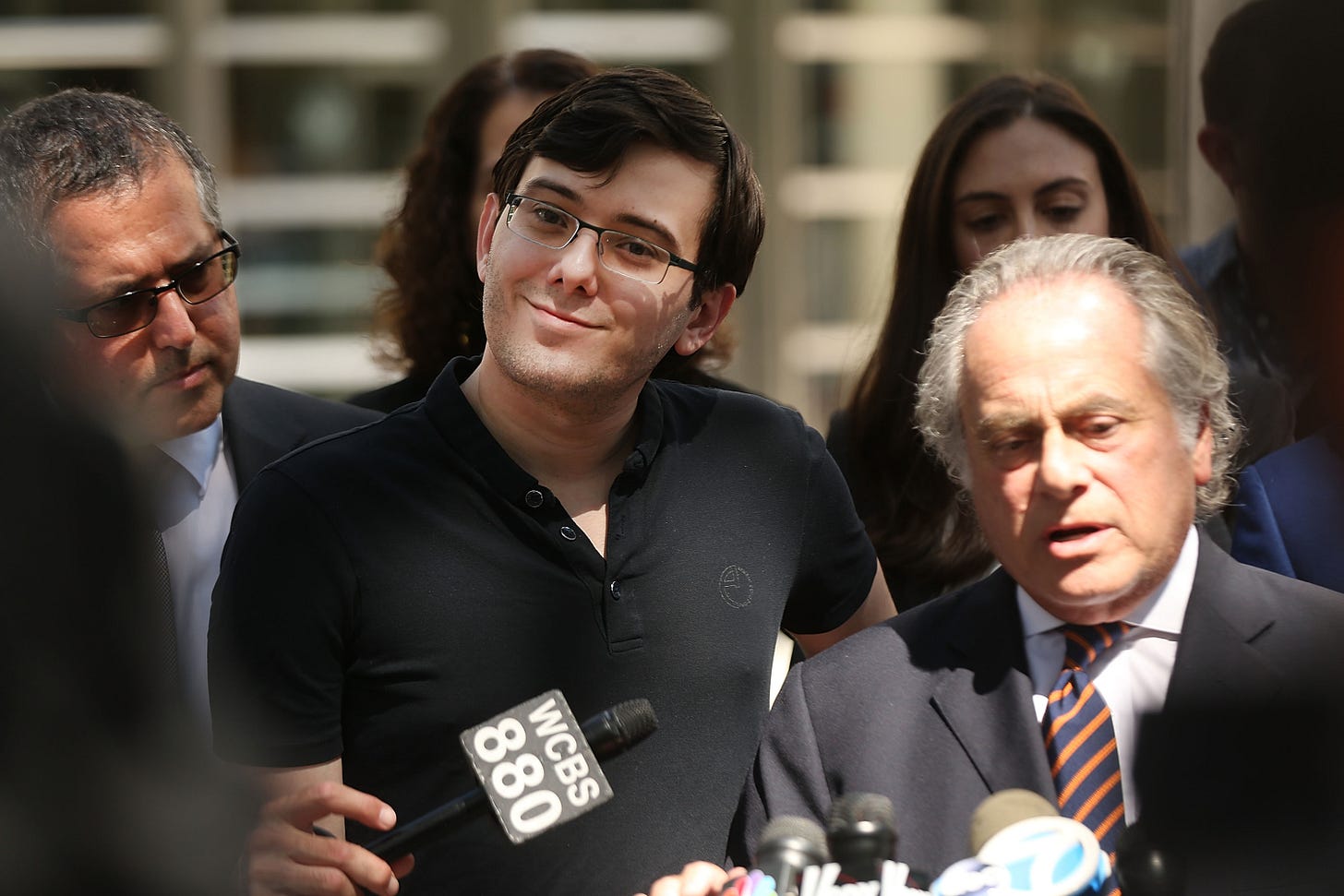Chapter 2, Part 4: "Of course…now I’m a felon.” (text only)
This is Chapter 2, Part 4 of SMIRK, a serialized memoir of my relationship with Martin Shkreli. This post, for paying subscribers, is an interview he gave to me after his fraud conviction in 2017.

Martin Shkreli rose to global infamy by raising the price of a toxoplasmosis drug by a staggering 5,000% while he was the CEO of a small pharmaceutical company in 2015. But that wasn’t the only scandal that kept him in the headlines. Just a few months after he set off a firestorm of outrage over prescription drug costs, he was arrested by federal agents and charged with fraud related to hedge funds he ran before he made a move into the pharmaceutical business.
I was a legal reporter for Bloomberg and I covered his case. Over the course of the litigation and his trial, Martin and I spoke reasonably often and developed a friendship. I eventually quit my job and for a time became his girlfriend while he was in prison. You are likely aware of the magazine profile published about me in December 2020, which revealed our romance and shocked much of the internet.
Back when Martin’s trial was drawing to a close in August 2017, we were still just friendly professional acquaintances. Because he tended to be candid and thoughtful when speaking to me, I suggested that I do an interview with him — possibly during one of his near-constant live-streams from his Manhattan apartment — after the jury reached its verdict. Martin often toyed with reporters trying to speak with him or trolled them online instead of giving them real insight. I thought since he and I had a good rapport that I could get him to be more honest and forthcoming.
He replied to me that he was open to it. But after he was convicted on Aug. 4, 2017 (of three of the eight crimes he was charged with), he went back to his old habits. Back in front of his computer in Murray Hill after the verdict, he invited a young female reporter for the New York Daily News, who had been lurking outside the apartment building, to come up and speak to him. He live-streamed the conversation as she attempted to ask him questions, and he replied with facetious or vaguely nonsensical answers.
I was in the press room in Brooklyn Federal Court, transcribing notes from the verdict, while he was doing this. I was surrounded by other journalists who had also been covering the trial. Someone turned on Martin’s live stream and we all looked on in horror.
“That’s my sister!” the reporter for the New York Times cried out. (Indeed, the New York Daily News reporter and the Times reporter were related.) Secretly, I felt a pang of guilt. After all, I had sort of unintentionally planted this idea in Martin’s head. Perhaps he would have done it anyway, but the resemblance of what was happening to the suggestion I made to him was uncanny.
A few weeks later, Martin finally allowed me to do the post-verdict interview with him I had requested. But it wasn’t for his live stream. It was for a book I had been trying to pitch. Preferring an “ironic” take, or something more along the lines of a “hit piece” than I was willing to produce, publishers didn’t bite. So the interview transcript has remained in my files, unseen by anyone except myself until now.
But here it is, at long last, for your consumption (shortened to the crucial parts and edited for clarity):
MARTIN SHKRELI INTERVIEW
At his apartment, 08/23/2017
Q. So walk me through mentally where you’ve been since the verdict.
Martin: It’s mostly been consistent. It’s also like Goundhog’s Day. I think it was a pretty good outcome. But nobody will know for sure. We won’t know until the sentence arrives. If that’s the only litmus test, then I think we mostly won. If I’m wrong on that, we’ll see. I’m betting — I bet with my mouth in some ways that I’m right about that. I could be wrong and eating crow, which is fine. That’s where I stand on that.

